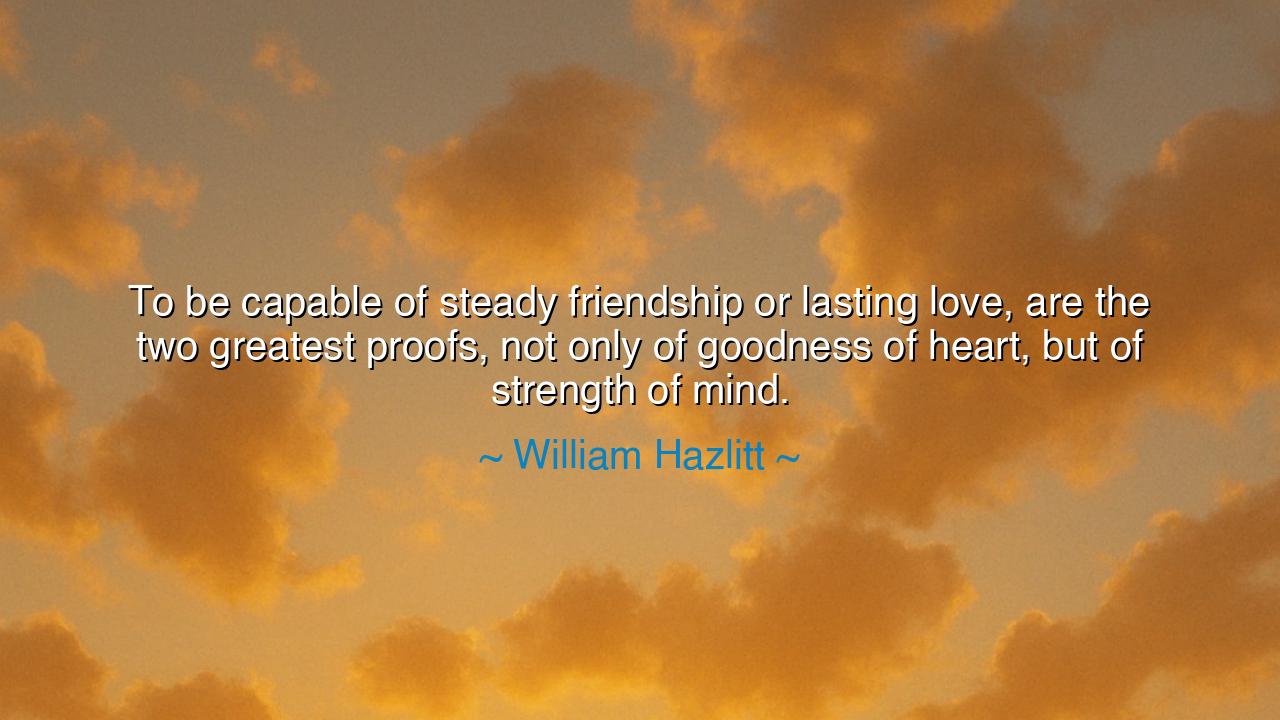
To be capable of steady friendship or lasting love, are the two
To be capable of steady friendship or lasting love, are the two greatest proofs, not only of goodness of heart, but of strength of mind.






"To be capable of steady friendship or lasting love, are the two greatest proofs, not only of goodness of heart, but of strength of mind." With these profound words, William Hazlitt touches on one of the deepest truths about human connection—that friendship and love are not mere happenstances of affection, but tests of character and resilience. Hazlitt emphasizes that to sustain genuine bonds of friendship or love over time requires not just emotional warmth, but strength of mind—a fortitude that allows individuals to overcome the inevitable trials that come with long-lasting connections. In this sense, friendship and love are not only reflections of the goodness of the heart, but also of the inner strength required to nurture, protect, and grow these relationships in the face of life’s challenges.
In the ancient world, the idea of enduring relationships was intertwined with the concept of virtue. Aristotle taught that the highest form of friendship is not based on pleasure or utility, but on mutual respect and the shared pursuit of goodness. Such a friendship, Aristotle believed, required not just mutual affection, but a commitment to helping each other become better versions of themselves. Similarly, true love, in the classical sense, was not merely about romantic affection but about mutual support, respect, and the ability to endure life’s hardships together. For both friendship and love to endure, individuals must have the strength of character to weather storms and the moral fortitude to support one another through difficulty.
The relationship between Achilles and Patroclus in Greek mythology is one example of such enduring bonds of friendship. Their deep affection for each other was tested in the crucible of war. When Patroclus was slain by Hector, the grief that Achilles experienced was not just an emotional response, but a profound testament to the strength of heart and mind that comes from a friendship rooted in virtue. Achilles’ decision to return to battle to avenge Patroclus’ death showed not just physical strength, but the strength of mind to honor their friendship, even at the cost of his own life. This tragic tale exemplifies how true friendship is not always easy, nor is it free of pain, but it is founded on a deep strength that allows us to persevere through the darkest moments.
Similarly, the love between David and Jonathan, as depicted in the Bible, serves as a powerful example of what Hazlitt describes. Despite their differences in status—David being a humble shepherd and Jonathan the son of a king—the two shared a bond that transcended the typical boundaries of friendship. Jonathan's loyalty to David was so steadfast that even when Saul, Jonathan’s father, sought David's life, Jonathan chose David’s safety over his own familial loyalty. This is a love that exemplifies both goodness of heart and strength of mind—a love that endures not just through affection, but through self-sacrifice, integrity, and the will to protect what is good in the face of personal loss.
In Hazlitt’s view, the endurance of friendship and love is a test of character. Many relationships falter under the weight of time, conflict, or miscommunication. But the relationships that endure are those where both parties possess the strength to weather these challenges and the compassion to understand one another’s flaws and weaknesses. To love or be a true friend is to continually offer the best of yourself to the other, even when it is difficult, and even when life’s circumstances challenge your patience and commitment.
In modern life, we often speak of love and friendship casually, but their true nature demands effort and resilience. In our era of rapid technological advancement, social media, and fleeting interactions, it is easy to overlook the profound work required to build and sustain meaningful relationships. Hazlitt’s words urge us to recognize that to truly love or be a friend is not just to enjoy the good moments but to show steadfastness and dedication when challenges arise. Friendship and love require us to meet each other’s needs, to forgive each other’s shortcomings, and to grow together as individuals.
The lesson to be taken from this wisdom is clear: enduring relationships, whether of friendship or love, are among life’s greatest treasures, and they require not just emotional warmth, but the strength to face adversity together. It is easy to form fleeting connections, but the real test lies in maintaining these bonds over time, through life’s ups and downs. Let us strive to nurture our friendships and romantic relationships with the same dedication, courage, and fortitude that Hazlitt describes. In doing so, we will cultivate the kind of relationships that are not only a source of joy but of inner strength and growth, leaving behind a legacy of true connection.






AAdministratorAdministrator
Welcome, honored guests. Please leave a comment, we will respond soon